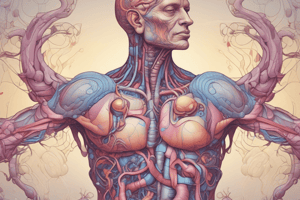Podcast
Questions and Answers
Vad är en konsekvens av att immunförsvaret börjar producera antikroppar som liknar TSH?
Vad är en konsekvens av att immunförsvaret börjar producera antikroppar som liknar TSH?
- Sköldkörteln producerar färre hormoner
- Sköldkörteln slutar producera hormoner
- Sköldkörteln börjar producera andra hormoner
- Sköldkörteln fortsätter producera mer hormoner (correct)
Vad är en av orsakerna till hypertyreos?
Vad är en av orsakerna till hypertyreos?
- En autoimmun reaktion mot sköldkörteln
- En hypofystumör
- En inflammation i sköldkörteln (correct)
- En infektion i sköldkörteln
Vad kan ultraljud visa när det gäller sköldkörteln?
Vad kan ultraljud visa när det gäller sköldkörteln?
- Om sköldkörteln är inflammerad
- Om sköldkörteln är förstorad
- Om sköldkörteln är förminskad
- Om det finns knölar på sköldkörteln (correct)
Vad är en effekt av att ha hypertyreos?
Vad är en effekt av att ha hypertyreos?
Vad är en konsekvens av att sköldkörteln producerar för mycket hormon?
Vad är en konsekvens av att sköldkörteln producerar för mycket hormon?
Vad kan skintigrafi visar när det gäller sköldkörteln?
Vad kan skintigrafi visar när det gäller sköldkörteln?
Vad är en symtom på hypertyreos?
Vad är en symtom på hypertyreos?
Hur kan sköldkörtelns överproduktion av hormoner minskas?
Hur kan sköldkörtelns överproduktion av hormoner minskas?
Vad är en följd av att sköldkörtelhormonerna tyroxin och trijodtyronin produceras i överskott?
Vad är en följd av att sköldkörtelhormonerna tyroxin och trijodtyronin produceras i överskott?
Vad kan orsaka att sköldkörteln producerar mer hormoner trots att det inte behövs?
Vad kan orsaka att sköldkörteln producerar mer hormoner trots att det inte behövs?
Vilken undersökning visas om sköldkörteln är inflammerad?
Vilken undersökning visas om sköldkörteln är inflammerad?
Vad är en följd av att cellerna arbetar mer?
Vad är en följd av att cellerna arbetar mer?
Vad kan orsaka menstruationsrubbningar?
Vad kan orsaka menstruationsrubbningar?
Vad är en effekt av att ha en hög ämnesomsättning i kroppen?
Vad är en effekt av att ha en hög ämnesomsättning i kroppen?
Vad kan användas för att behandla hypertyreos?
Vad kan användas för att behandla hypertyreos?
Vad visas med hjälp av skintigrafi?
Vad visas med hjälp av skintigrafi?
Flashcards are hidden until you start studying
Study Notes
- Hypertyreos
Hypertyreos, also known as thyrotoxicosis, is a condition where the thyroid gland produces an excessive amount of thyroid hormones, specifically triiodothyronine (T3) and thyroxine (T4). This leads to an increased metabolic rate in the body, causing the cells to work harder and placing a significant strain on the body. The thyroid gland, located in the neck, plays a vital role in regulating metabolism, growth, and development. The excessive production of thyroid hormones can have severe consequences on the body's overall health if left untreated.
The symptoms of hypertyreos can vary from person to person, but common signs include:
- Increased appetite, which can lead to weight loss despite normal food intake. This is because the body's metabolic rate is accelerated, causing it to burn calories at a faster rate.
- Frequent bowel movements or diarrhea. The increased metabolic rate can lead to an accelerated digestive process, resulting in more frequent bowel movements.
- Difficulty sleeping or insomnia. The excess thyroid hormones can cause an increased heart rate and blood pressure, making it challenging to fall asleep.
- Rapid heartbeat or palpitations. The increased heart rate can cause palpitations, which can be uncomfortable and even alarming for some individuals.
- Tremors or shakiness in the hands. The excess thyroid hormones can cause muscle weakness and tremors, especially in the hands.
- Increased sweating. The accelerated metabolic rate can lead to excessive sweating, especially in warm environments.
- Enlargement of the eyeballs, known as exophthalmos. This is a characteristic symptom of Graves' disease, an autoimmune disorder that can cause hypertyreos.
- Heat intolerance, leading to increased body temperature. The increased metabolic rate can cause the body to produce more heat, leading to heat intolerance.
- Menstrual irregularities in women. The excessive thyroid hormones can disrupt menstrual cycles, leading to irregularities or cessation of menstruation.
- Mood changes, such as anxiety or irritability. The excess thyroid hormones can cause mood swings, anxiety, and irritability due to the body's accelerated metabolic state.
Hypertyreos is more common in women than men, and it can occur at any age, although it is most prevalent in people between 20 and 40 years old. The condition is often misdiagnosed or underdiagnosed, leading to delayed treatment and potential long-term complications.
Causes
The main causes of hypertyreos include:
- Graves' disease, an autoimmune disorder where the immune system produces antibodies that stimulate the thyroid gland, leading to an overproduction of thyroid hormones. This is the most common cause of hypertyreos, accounting for approximately 70% of cases.
- Thyroiditis, an inflammation of the thyroid gland, which can cause the gland to release excessive amounts of thyroid hormones. This condition is typically caused by a viral or bacterial infection.
- A thyroid nodule or cyst, which can produce excess thyroid hormones. These nodules or cysts can be benign or cancerous and may require surgical removal.
- A hypopituitary tumor, which can cause the pituitary gland to produce excess thyroid-stimulating hormone (TSH), leading to an overproduction of thyroid hormones. The pituitary gland regulates the thyroid gland's function, and a tumor in this area can disrupt hormone production.
- Excessive iodine intake, which can stimulate the thyroid gland to produce excess thyroid hormones. This is more common in areas where the soil and water have high iodine concentrations.
- Certain medications, such as amiodarone, which can contain high levels of iodine and stimulate the thyroid gland.
Diagnosis
The diagnosis of hypertyreos is typically made through a combination of:
- Physical examination, including a thorough medical history and examination of the thyroid gland. A doctor may perform a physical examination to check for signs of hypertyreos, such as an enlarged thyroid gland, rapid heartbeat, or tremors.
Hypertyreos
- Hypertyreos karakteriseras av en överproduktion av sköldkörtelhormonerna tyroxin och trijodtyronin.
- Det leder till en förhöjd ämnesomsättning i kroppen och cellernas ökade arbete blir en stor påfrestning för kroppen.
- Hypertyreos är vanligare hos kvinnor än män.
Orsak
- Immunförsvaret producerar antikroppar som liknar TSH, vilket leder till ökad produktion av sköldkörtelhormoner.
- Hypertyreos kan också orsakas av en inflammation i sköldkörteln (tyreodit) eller en hypofystumör.
Symtom
- Ökad aptit
- Viktnedgång trots normal matsmältning
- Diarré
- Sömnsvårigheter
- Snabb puls (takykardi)
- Skakningar/darrningar (tremor)
- Förhöjd kroppstemperatur
- Menstruationsrubbningar
- Trötthet
- Svettningar
- Ögonglober som buktar ut (exoftalmus)
- Högvarv
Undersökning
- Blodprover mäter nivåerna av tyroxin och trijodtyronin.
- Blodprover kan också påvisa antikroppar mot sköldkörteln (TRAK).
- Nivåerna av TSH kontrolleras.
- Ultraljud, biopsi och datortomografi kan utföras för att utreda orsakerna till sköldkörtelproblemen.
Skintigrafi
- En skintigrafi utförs för att ta reda på sköldkörtelns ämnesomsättning, cirkulation och form.
- Radioaktivt ämne tillförs blodet via en ven, och bilder tas ur olika vinklar med en speciell kamera.
Behandling
- Beroende på orsaken till sjukdomen, kan behandlingen vara läkemedelsbehandling med tyreostatika eller radioaktivt jod.
- I vissa fall behövs kirurgi där hela eller delar av sköldkörteln opereras bort.
- Vårdtagare med hypertyreos riskerar drabbas av nedstämdhet och utmattning.
Studying That Suits You
Use AI to generate personalized quizzes and flashcards to suit your learning preferences.




